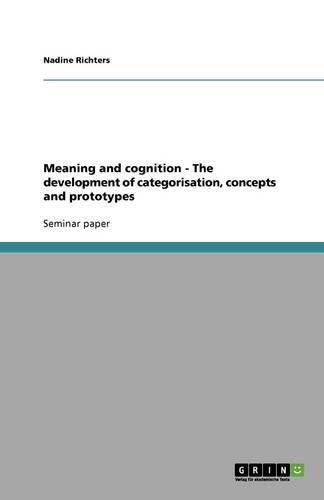Readings Newsletter
Become a Readings Member to make your shopping experience even easier.
Sign in or sign up for free!
You’re not far away from qualifying for FREE standard shipping within Australia
You’ve qualified for FREE standard shipping within Australia
The cart is loading…






Seminar paper from the year 2008 in the subject English Language and Literature Studies - Linguistics, grade: 2,3, University of Hamburg (IAA), course: Seminar Linguistik: Semantics: Understanding the meaning of words and their combinations, 18 entries in the bibliography, language: English, abstract: This term paper deals with the development of categorisation, concepts and prototypes in terms of cognitive psychology. In recent decades, prototype semantics has begun to gain an important role in linguistics and led to a pardigm shift. This is proved by research in cognitive psychology. People have a command of categorising, all times. Without the process of categorisation, our brain would be overstrained because the flood of information, the brain receives, has to be memorised and, thus, categorised, in a certain way. First of all, I will explain the importance of categorisation and concepts in everyday life, then I will introduce some forms of categorisations (Artistotle’s traditional view and the prototype theory), explain them by giving examples, analyse and criticise them, insofar as I consider them critisisable. In section three I will describe the development of categorisation, concepts and prototypes with regard to childhood. One important question in this context will be whether prototypes are changeable in the course of life? The process of categorisation by having some concepts in mind, is an important factor in human existence. Human beings categorise what they perceive by comparing the perceived object with their mentally represented concept. All people think categorically because it helps them to establish a certainty and order. People need certainty and order, for not drowning in chaos. Without categorising, human beings would have to store the information of each single element which encounters him. Categories and concepts help us to understand the world, its elements and we establish a form of cohesive network by building up concepts and categori
$9.00 standard shipping within Australia
FREE standard shipping within Australia for orders over $100.00
Express & International shipping calculated at checkout
Stock availability can be subject to change without notice. We recommend calling the shop or contacting our online team to check availability of low stock items. Please see our Shopping Online page for more details.
Seminar paper from the year 2008 in the subject English Language and Literature Studies - Linguistics, grade: 2,3, University of Hamburg (IAA), course: Seminar Linguistik: Semantics: Understanding the meaning of words and their combinations, 18 entries in the bibliography, language: English, abstract: This term paper deals with the development of categorisation, concepts and prototypes in terms of cognitive psychology. In recent decades, prototype semantics has begun to gain an important role in linguistics and led to a pardigm shift. This is proved by research in cognitive psychology. People have a command of categorising, all times. Without the process of categorisation, our brain would be overstrained because the flood of information, the brain receives, has to be memorised and, thus, categorised, in a certain way. First of all, I will explain the importance of categorisation and concepts in everyday life, then I will introduce some forms of categorisations (Artistotle’s traditional view and the prototype theory), explain them by giving examples, analyse and criticise them, insofar as I consider them critisisable. In section three I will describe the development of categorisation, concepts and prototypes with regard to childhood. One important question in this context will be whether prototypes are changeable in the course of life? The process of categorisation by having some concepts in mind, is an important factor in human existence. Human beings categorise what they perceive by comparing the perceived object with their mentally represented concept. All people think categorically because it helps them to establish a certainty and order. People need certainty and order, for not drowning in chaos. Without categorising, human beings would have to store the information of each single element which encounters him. Categories and concepts help us to understand the world, its elements and we establish a form of cohesive network by building up concepts and categori